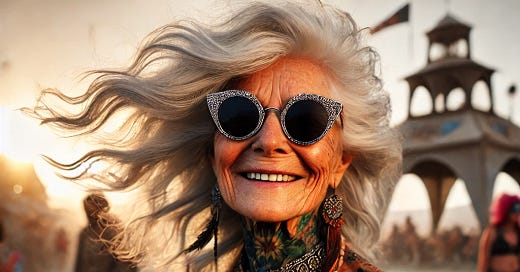At Burning Man last year, a friend of a friend’s 80-year-old aunt was denied entrance to the Orgy Dome. Apparently, her nephew had been concerned about taking the oldster to Burning Man, but she explored its offerings independently and fearlessly, even if she couldn’t partake of them all.
The one time I went to Burning Man, in my early forties, I remained blissfully unaware that there was an Orgy Dome. But if I’d stumbled upon it and tried to get in, that wouldn’t have made as interesting a story as an 80-year-old attempting to enter. At least, it wouldn’t have seemed funny or cute.
Why was she turned away? Were there specific age and beauty standards she didn’t measure up to? Maybe they only accept couples. I’ll never know. But to me, the more salient question is, Why should this be an amusing story? Why shouldn’t an 80-year-old be just as interested in an Orgy Dome as anyone else, and why shouldn’t she experience it if she wants to?
People who have aged
This story was just one more reminder among way too many of the persistent characterization of old women as sweet old ladies. Though I’m not yet elderly, as a 63-year-old I can tell you with some authority that we older women are not universally sweet.
Old people are just people who have aged; old women are just women who have aged. Although people can change and evolve throughout our lives, if we’re lucky, that generally means becoming wiser, more resilient, and more humble. Our basic personalities don’t change much; what I’ve observed is that most of us become more ourselves as we get older. That’s a good motivator to do the work now to become the best version of ourselves we can be. But none of this means we get sweeter. None of this means that being an old woman equals being sweet. If you’re sweet when you’re young, there’s a good chance you’ll be sweet when you’re old. But it has nothing to do with your age.
Old people are people who have done all kinds of things. That can include taking risks, being subversive, rebelling, making trouble — and yes, even having sex. We don’t automatically revert to some state of childhood innocence when we pass a certain age.
While men are also subject to sweet old man stereotypes, it’s much worse for women. We all know that, but here’s some semi-scientific verification: Google offered me 795,000 search results for “sweet old lady” and 370,000 for “sweet old man.”
That’s not my only reason for focusing on sweet old ladies: I think about this topic from time to time, and it was brought to the forefront of my mind by Women’s History Month. If you’re a longtime Flower Child reader, you know how I feel about that — but despite my fervent desire that we not need such a month, when March comes around I feel compelled to write about women.
Perceptions of older women
The sweet old lady trope comes with certain ideas about how old women should behave — like not going to Orgy Domes. And those are bolstered by our ideas about how old women look.
On the TV show What not to Wear, Stacy London used to talk about “old-lady sweaters.” While she’s since changed her ways, we all know what she meant by that.
For decades, we’ve been regaled with images of older women wearing frumpy, dowdy clothes. Pastel colors. House coats. Oversized sweaters with designs that could just as easily be found on children’s clothing. Polyester pants suits. All of these outfits paired well with short blue hair styled with rollers.
I can understand dressing differently as your body changes; different clothes suit different shapes. I can understand a greater need for sweaters when our tolerance for cold diminishes as we age. But why the drastic change in style?
Overall, the “old-lady” style is more conservative. Why? Do people change their worldviews and ideologies just because they age? I haven’t found that to be the case (and some claim my Flower Child generation, aka Gen Jones, is now leaning more left than it used to). So, why should our style change?

Actual older women
Fortunately, it’s becoming much more common for older women to dress like adults of any age, rather than according to some confining idea of sweet-old-lady attire.
You can see how styles and expectations have changed in this image I’ve shared before of The Golden Girls (1985–1992) versus And Just Like That (2021–2023), both featuring characters in their mid-50s.
In Grace and Frankie (2015–2022), the characters in their late 70s dress like themselves, not like “sweet old ladies.”
Judith Boyd, aka Style Crone, an actual woman in her early 80s, embraces fashion’s creative self-expression and shows that old women can wear anything we want (check out her Instagram!).
I hope that as older women dress more normally, that will help us to be seen as the multidimensional people we are. Older women have power, which cutesifying and diminishing us as “sweet old ladies” takes away from us. We have wisdom and strength gained from our years of experience. We have a lot to offer.
Older women I know are showing the way. The two 80-year-old family friends I visited in Paris last fall both dress like themselves and lead active lives. One spends her time providing shelter for abused women in Lebanon, in between writing and creating music; the other hikes regularly and goes dancing four to five times a week.
Like the aunt who tried to get into the Orgy Dome, these women and others around the world are living their lives and doing the things people do. They’re not sitting at home being sweet. They’re at Burning Man, they’re dancing, they’re protesting in the streets. Let’s start seeing them for what they are: women who have aged, and who have a lot left in them to contribute to the world.
We are not sweet old ladies. We never were, and we never will be.
My previous Women’s History Month posts:












What fun THIS is! Yeah, don't bother calling me sweet OR cute, or grandmotherly. Don't act shocked when I talk like a sailor either. 😉
Great!!! And thank you! Sorry, I don't have enough time to talk about my clothes... but they are not what my grandmother would have approved of. However, my mother would have. Because she didn't 'fit the mold' either. But she always looked happy. (and nice)